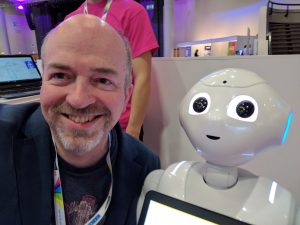
Jisc futurist Martin Hamilton
Martin Hamilton, a futurist at JISC – providing digital solutions for UK education and research – shares his thoughts on the future of technology in education as part of our #TomorrowsEd series…
Remember the Babel Fish in the Hitch Hiker’s Guide to the Galaxy? Just pop one in your ear and it will translate anything said to you in any form of language.
The Babel Fish might be fictional, but the truth is that researchers are starting to understand how long term memories are stored in our brains as groups of neurons – so it might not be totally unrealistic to picture future learners simply taking a pill to learn a language or a new skill. Or even for fun – happy memories of that beach holiday you couldn’t afford!
Let’s imagine that you could take a brain surgery pill, or a civil engineering pill – and become an instant expert. At least on paper – practice might be a little different! Of course we’re not there yet, and indeed we might never be. But, and it’s a big but: Virtually all of human knowledge is available online, yet our schools, colleges and universities still ask learners to memorise key facts and formulae.
Ban phones in schools? Or give every learner a tablet?
Perhaps it’s time to ask ourselves what we really need to assess – 1066 and all that, or the ability to marshall the available facts and information and use them to good effect? It feels like we’re at a crossroads when it comes to technology and education. Should we ban phones in schools, or give every learner a tablet?
I’ll be the first to admit that it’s not as simple as I’ve just made out – if we took an open book (or phone, or tablet) approach to exams, we’d need to consider how that works in quite a range of different subject areas. From constructing an argument to support an assertion (“there will be no downside to Brexit!”), to figuring out which statistical tests to use on a dataset, or writing a computer program.
There are some subject areas like statistics where it’s long been commonplace to permit textbooks to be brought in to exams, but we should perhaps also question the role of the high stakes final assessment while we are busy reinventing education
Virtual and augmented reality
But computers and the internet have already found their way into most aspects of our lives, and it seems odd not to be looking at how we can make the most of them in teaching and learning. This is where I am always fascinated by the groundbreaking work of the Open University in making distance learning an option for over 2 million learners.
Long before anyone had started to talk about Massive Open Online Courses, the OU were broadcasting degree level lectures using the ‘dead time’ after the day’s broadcasting had finished. How quaint that seems in our present day era of streaming media and 24 hour news!
The OU embraced distance learning over the Internet wholeheartedly through tools like FirstClass, Moodle and GSuite – latterly using virtual and augmented reality to provide remote STEM lab experiences and virtual field trips, and creating the FutureLearn online learning platform. I’m fascinated to see how the OU will use the next wave of technologies like artificial intelligence and blockchain. Hold on to your towel, it’s going to be a bumpy ride!



